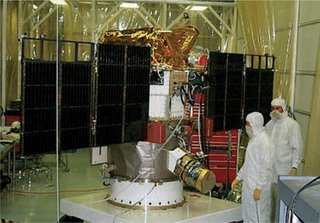Houston, we have a problem...
 In discussions about the science of Global Warming, the earth's albedo has become an increasingly important point of discussion. The earth's albedo is the ratio of solar radiation reflected by the earth to the total amount of radiation that reaches the earth from the sun. Clouds, the polar ice caps, forests, the oceans, deserts,... all contribute to the earth's albedo by absorbing or reflecting solar radiation. If sunlight is absorbed by a body, obviously it becomes hotter, if sunlight is reflected, by clouds for instance, that energy would not be available to heat the earth's surface. In discussions about the science of Global Warming, the earth's albedo has become an increasingly important point of discussion. The earth's albedo is the ratio of solar radiation reflected by the earth to the total amount of radiation that reaches the earth from the sun. Clouds, the polar ice caps, forests, the oceans, deserts,... all contribute to the earth's albedo by absorbing or reflecting solar radiation. If sunlight is absorbed by a body, obviously it becomes hotter, if sunlight is reflected, by clouds for instance, that energy would not be available to heat the earth's surface.Determining the albedo of an entire planet is extremely difficult, especially from the surface of that planet. Changes to the earths's atmosphere such as increased cloud cover caused by increases in evaporation due to elevated surface temperatures may counteract or even reverse the heating effects caused by increased atmospheric CO2. Pollution, snow and ice cover, desertification, and other human activities also effect the earth's albedo contributing to, or mitigating the effects of global warming. An accurate determination of the earth's albedo at present and measuring changes in the albedo is important to determining how much, or even whether at all global warming is occurring. In March of 1998 a proposal to build and launch the "Deep Space Climate Observatory", the sattelite in the picure above, was offered and the planned launch was set for 2001. The satellite was designed to be positioned between the earth and the sun such that the gravity of the earth would be cancelled out by the gravity of the sun creating a stable surface to observe the sunlit side of the earth continuously, "We could get an incredible set of data" of the impact of albedo on climate, says Robert Charlson, a climate scientist at the University of Washington, Seattle. Delays and budget cut-backs forced back the launch date, the Columbia disaster in 2003 delayed launch again, and now further cutbacks have now grounded the project for good so that a largely complete, exremely useful (whether you accept global warming or not), multi-million dollar satellite will remain on earth. Your tax dollars at work. The only blog inspired by a bumper sticker. |










Comments on "Houston, we have a problem..."
-
 Anna said ... (8/27/2023 2:23 AM) :
Anna said ... (8/27/2023 2:23 AM) :
post a commentHi nice reading youur blog